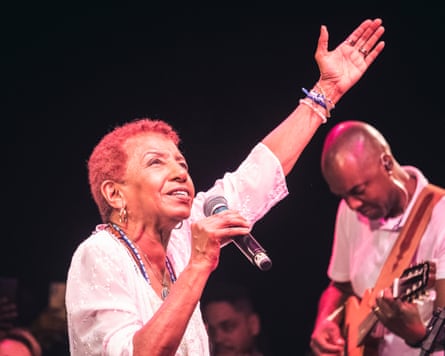As soon as she arrives at the headquarters of Rosas de Ouro, a popular samba school in São Paulo, Leci Brandão apologises for being late. Coupled with the megacity’s usual traffic, her agenda at its legislative assembly kept her busy longer than expected. “My mission is trying to solve other people’s problems,” she says after greeting school staff. A lawmaker with Brazil’s Communist party since 2011, Brandão – who turns 80 on Thursday – is the first Black woman to occupy a seat in São Paulo parliament this long and only the second Black congresswoman in its history.
While she had never imagined herself in office, institutional politics unfolded as an extension of her music. Brandão is also a trailblazing samba musician, one of the first female composers in the male-dominated genre, breaking through in 1976 with politically engaged songs that exposed and opposed the conservatism and inequalities of Brazilian society.
Until the early 1980s, progressive songs were often censored as an oppressive military regime run by Brazil’s armed forces had been ruling the country since 1964: composed in 1978 but unreleased for seven years owing to tensions with her label, which thought her music too heavy, Brandão’s Zé do Caroço tells the true story of a favela leader who helped raise his community’s political consciousness. It remains a resistance anthem to this day.
Writing political songs “results from my life condition”, says Brandão. “I was born as a Black girl who grew up poor. I felt the need to express what I witnessed and experienced. If it weren’t through songs, maybe I’d be a journalist,” she says, sipping water and touching up her red lipstick.

Brandão’s was a working-class home in Rio de Janeiro’s outskirts, where her father’s record player set the cheerful tone of family life. “We never ran out of music,” she says. Her mother and grandmother, meanwhile, were members of the Mangueira samba school, and her father’s eclectic 78rpm records – from Nat King Cole classics to Jacob do Bandolim’s choros to Bienvenido Granda’s boleros – inspired her curiosity for music. But her father died when she was 19 years old, prompting Brandão to work jobs such as telephonist and factory operator to help make ends meet; for years, she lived in the back house of various public schools in Rio with her mother, who worked in them as cleaner, janitor and cook.
“I felt really sorry for my mom,” Brandão says. “She had to clean classrooms in the morning, afternoon and evening, so I helped her do the hard work. Serving people has, somehow, always been part of my life.” When elected for the first time, she immediately called her mother to tell the news. “I told her that the janitor’s daughter had become a state deputy of São Paulo. We both cried.”
Brandão taught herself singing and percussion, and heartbreak inspired her to write her first song at the age of 21, a bossa nova-like number that ended up not getting recorded. “I discovered I was a composer because of this longing, this suffering,” she has previously said. But her music soon grew closer to samba, and to progressive politics.
In 1972 she became the first female composer at the samba school her mother and grandmother had attended, one of the most traditional in Rio, and earned renown from winning a TV singing show and participating in the famous samba nights at the Opinião theatre – a headquarters for left-leaning resistance in Rio at the time. Come 1974, Brandão launched her debut album with songs such as Preferência, which satirised the arrogance of an evening with the Rio bourgeoisie in contrast with the generosity and spontaneity of a gathering in Mangueira.
From then on, “people would question why I composed so many songs about social issues,” says Brandão, whose music shed light on themes as diverse as Afro-Brazilian religions, Black feminism, freedom of expression and the Amazon: “I wrote about things that messed with my head. My songs talk, above all, about human behaviour.” In the late 1970s, she was questioned by military authorities as one of her songs encouraged people to watch plays to understand Brazil’s political scene. This atmosphere stirred tensions between Brandão and her label at that time, Polygram, which refused many of her songs. Under growing pressure, Brandão terminated her contract in 1981; it would be more than four years until she released new music.
Brandão also chafed against prevailing conservativism when she came out as gay in a late-70s interview; she also regularly sang about homophobia and the dignity of LGBTQ+ people in songs such as Ombro Amigo, Assumindo and As Pessoas e Eles. While some people were shocked, Brandão was supported by her fellow composers at Mangueira. “People questioned the directors for having me there after I gave that interview. But I stayed in the group as I have always respected everyone and they respected me back,” she says.
And in 1985, the success of her self-titled comeback album kept her as part of the samba institution. In the 1990s, she won the Brazilian Music award for best samba singer, received honorary titles from the city councils of Rio and São Paulo, and became a popular commentator for Brazil’s biggest TV channel’s coverage of samba school carnival parades.

Brandão’s links with the world of party politics took root in the 2000s, when she became a councillor on race equality and women’s rights for President Lula’s first government. She performed at his second-term inauguration in 2007, and then, two years later, the Communist party of Brazil invited her to become a candidate for the São Paulo legislative assembly. Brandão built her agenda based on themes she had already spoken about as an artist, including Black culture, gender equality and LGBTQ+ rights. In 2010, she won.
Taking office, however, wasn’t easy in the beginning. “The fact that a samba artist became a lawmaker astonished people,” says Brandão, recalling pejorative comments she often heard in her first term. “Journalists and parliamentarians would ask what the samba gatherings were like in my cabinet!”
But she has persisted, and has spent her political life fighting for progressive artistic expression: in March, Brandão authored and helped approve a bill that adds hip-hop culture to the intangible heritage of São Paulo state. “Hip-hop artists have the wisdom to approach our social problems in a strong, beautiful way,” she says.
Brandão says she hopes to stay healthy for another term and continue a life mission where social justice is a common denominator between samba and politics. “I will keep on fighting for equality and respect,” she says. “I am not a celebrity. I identify as community.”
Source: theguardian.com


















